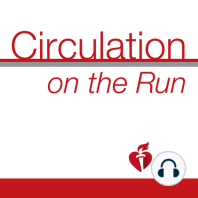17 min listen
Circulation April 10, 2018 Issue
ratings:
Length:
25 minutes
Released:
Apr 9, 2018
Format:
Podcast episode
Description
Dr. Carolyn Lam: Welcome to Circulation On The Run, your weekly podcast summary and backstage pass to the journal and its editors. I am Dr. Caroline Lam, Associate Editor from the National Heart Center and Duke National University of Singapore. Can we reverse the cardiac effects of sedentary aging? Well if you're curious, you have to read the feature paper in this week's journal, as well as listen to the upcoming discussion of a trial that addresses this issue. All coming right up, after these summaries. Desmond mutations are known to cause skeletal and cardiac muscle disease, and also recently has been described in patients with inherited arrhythmogenic right ventricular cardiomyopathy or dysplasia. In today's first original paper, however, authors identified a novel Desmond mutation in a large Spanish family with inherited left ventricular arrhythmogenic cardiomyopathy or dysplasia, and a high incidence of, at first, cardiac events. First in corresponding author, Dr. Bermudez Jimenez from Granada, Spain, describe for the first time the largest family to date with a single Desmond mutation with a phenotype of left dominant arrhythmogenic dysplasia in the absence of skeletal myopathy symptoms and atrioventricular conduction disorders and supported by strong clinical and functional data. In a series of elegant experiments using explanted cardiac tissues and mesenchymal stem cell derived cardio myocyte from the family members, the author showed that the pathogenic mechanism probably corresponds to alteration in Desmond dimer and oligomer assembly and its connection with membrane proteins within the intercalated discs, thus Desmond mutations should be suspected in patients presenting with a cardiomyopathy characterized by mild left ventricular systolic dysfunction and/or dilatation, fibrosis, ventricular arrhythmias and a family history of sudden death. The next study is the first large scale report examining the incremental risk of surgical aortic root enlargement in patients undergoing aortic valve replacement. First author Dr. Rocha, corresponding author Ouzounian from University of Toronto and their colleagues sought to evaluate the early outcomes of patients undergoing aortic valve replacement with or without surgical aortic root enlargement. Now aortic root enlargement allows for larger prosthesis implantation and maybe an important adjunct to surgical aortic valve replacement in the transcatheter valve in valve era. Among more than 7,000 patients undergoing aortic valve replacement at a single institution from 1990 to 2014, the authors observed no incremental risk in post-operative mortality or adverse events following surgical enlargement of the aortic root as compared to aortic valve replacement alone. They therefore concluded that surgical aortic root enlargement appears to be a safe adjunct to surgical aortic valve replacement in the modern era. The next study suggests that in patients with acute coronary syndrome and an LDL cholesterol above 50 milligrams per deciliters, health care providers should consider adding ezetimibe to statins, particularly in two patient subgroups. First in corresponding author Dr. Giugliano from the TIMI study group at Harvard Medical School in Boston, Massachusetts and his colleague explored outcomes stratified by diabetes in the "improve it" trial where patients with a recent acute coronary syndrome were randomized to ezetimibe versus placebo on top of backgrounds in the statin. They found that
Released:
Apr 9, 2018
Format:
Podcast episode
Titles in the series (100)
Circulation January 24, 2017 Issue: Circulation Weekly: Your Weekly Summary & Backstage Pass To The Journal by Circulation on the Run
